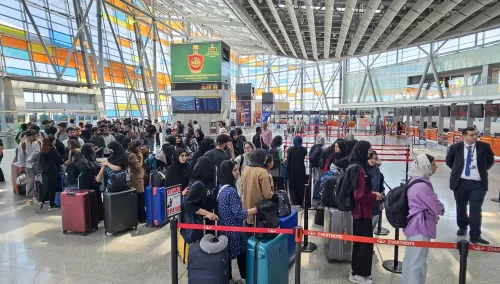Is India Emerging as the Strategic Hub for Global Corporations in Asia-Pacific?

Synopsis
Key Takeaways
- India represents 47% of APAC office leasing volumes as of 2024.
- Strong demand from Global Capability Centres boosts leasing activity.
- Key cities like Bengaluru and Delhi-NCR are at the forefront of this growth.
- Build-to-suit and flexible leasing options are gaining traction.
- India's economy shows resilience against global shocks.
Mumbai, May 23 (NationPress) In 2024, India represented 47 percent of all Asia-Pacific (APAC) office leasing activities, a significant increase from 36 percent in 2015. This growth highlights the country's strategic importance in light of trade shifts, supply chain diversification, and macroeconomic challenges, according to a recent report.
The office transaction volume in India reached a record high of 6.68 million square meters (or 7.19 million square feet) in 2024, driven by strong demand from Global Capability Centres (GCCs), multinational firms, and third-party IT service providers, as reported by Knight Frank.
This report underscores India’s position as a long-term, stable hub for businesses seeking cost-efficiency, talent availability, and infrastructure readiness, especially in key cities like Bengaluru, Hyderabad, Pune, and Delhi-NCR.
According to Shishir Baijal, Chairman and Managing Director of Knight Frank India, “India’s share of APAC’s office leasing volumes climbing to 47 percent showcases the country’s robust fundamentals and increasing attractiveness as a strategic hub for global enterprises.”
He further noted, “As international companies strive for operational resilience amidst ongoing trade realignments, India’s real estate sector is well-positioned to contribute significantly to regional growth.”
While various APAC markets face oversupply issues, such as Shanghai and Beijing, Indian industrial centers like Mumbai, Delhi-NCR, and Bengaluru have maintained balanced vacancy levels, supported by consistent leasing activity.
In India, build-to-suit formats and flexible leasing options are gaining popularity, indicating a shift towards customization and operational flexibility.
The country is categorized under the ‘low exposure, moderate resilience’ quadrant, signifying relatively low dependence on external trade and a strong capacity to absorb global shocks.
Unlike export-driven economies like South Korea and Singapore, India’s substantial domestic consumption, prudent fiscal policies, and diversified services sector insulate it from external volatility, establishing it as a reliable anchor in the region, the report states.
India’s ongoing success is supported by rising domestic demand, digital transformation, and readiness on the supply side across Grade A commercial properties.
As businesses adjust real estate portfolios to navigate volatility and explore new markets, India’s evolving real estate landscape presents both scalability and stability, the report concluded.










